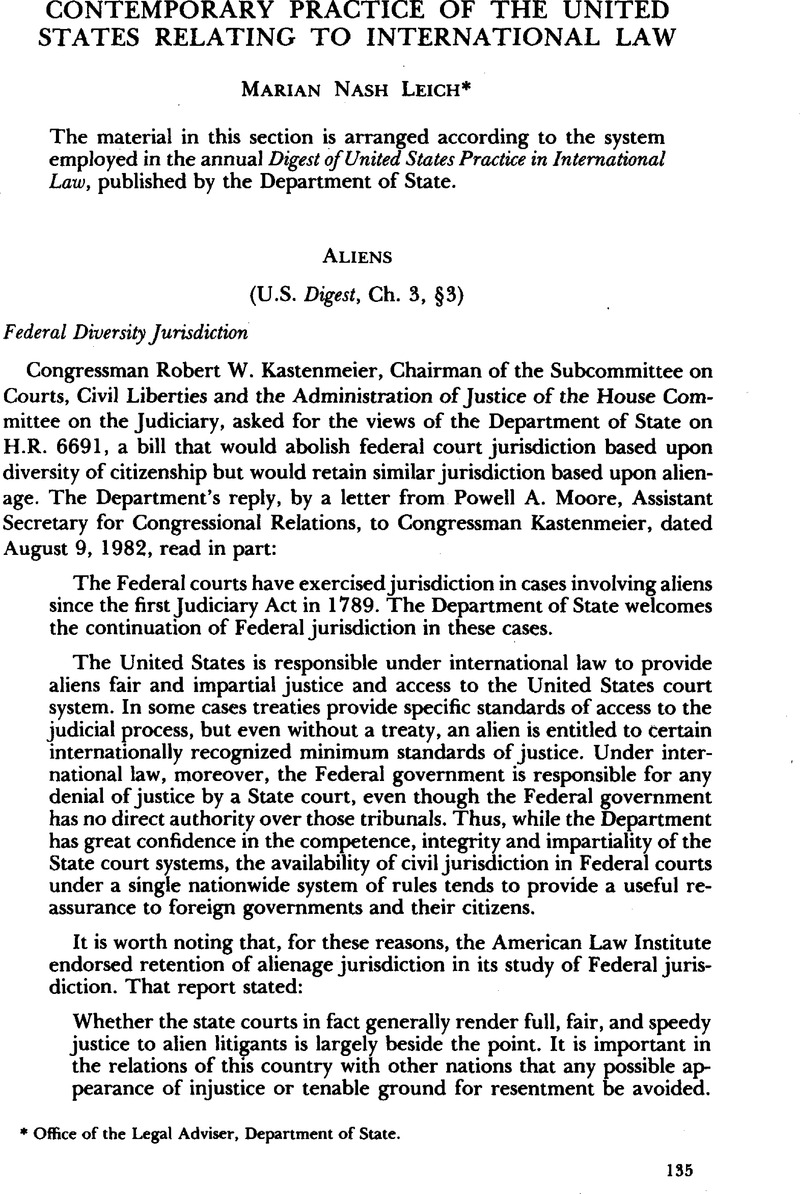No CrossRef data available.
Published online by Cambridge University Press: 27 February 2017

1 Dept. of State File No. P82 0127–0417.
The Department had made a similar recommendation in 1977 in regard to H.R. 9622, 95th Cong., 1st Sess. (1977). See H.R. Rep. No. 95–893, 95th Cong., 2d Sess. (1978).
1 See In re Uranium Antitrust Litigation. Westinghouse Electric Corp. v. Rio Algom Ltd., 617 F.2d 1248 (7th Cir. 1980).
2 Dept. of State File No. P82 0147–0738.
On Aug. 23, 1982, Judge McGovera directed that an order be entered in the minutes granting the motion of the Government of the United Kingdom to file an amicus curiae brief and for access to the pleadings, access to be permitted for the attorneys only and under the terms of the protective orders in the case.
1 The headings to the quoted portion of the letter and most of the footnotes are omitted here.
2 The travaux préparatoires of the American Convention do not address the relationship of Articles 74(2) and 75. The draft Convention which was prepared by the Commission for consideration at San Jose would have permitted reservations only if a constitutional provision were contrary to a provision of the Convention. Draft Inter-American Convention on Protection of Human Rights, OEA/Ser.K/XVI/1.1 (Sept. 22, 1969), at 22. In the written observations submitted on this draft, both Argentina and the Dominican Republic objected that it was inconsistent with the Vienna Convention on the Law of Treaties. Conferencia Especializada Interamericana sobre Derechos Humanos, OEA/Ser.K/XVI/1.2 (1973), at 48, 51. Similarly, the United States proposed eliminating Article 66 on the grounds that it restricted the customary scope of reservations, which included inconsistency with legislation and judicial decisions as well as constitutional provisions. Id., at 89. The working group which considered this article amended the Commission draft to refer to “constitutional or legal provisions,” but, at the committee level, the words “or legal” were removed. The committee decision was based on Article 11(1) of the Convention which obligated States Parties to adopt the necessary legislative measures to implement the rights conferred by the Convention. A U.S. proposal to substitute an article referring to the Vienna Convention failed in committee. Id., at 379. However, at the plenary session, an extended debate took place on the system to be adopted concerning reservations. Unfortunately, the record merely notes that the final outcome was the adoption of a proposal by Uruguay which referred to the Vienna Convention. Id., at 459.
3 From the point of view of the jurisdiction of the Inter-American Commission on Human Rights, once a ratifying or adhering State becomes a Party to the American Convention in relation to one other State, the ratifying or adhering State is bound under international law to respect the terms of the American Convention. As such, it is a State Party to the American Convention for the purposes of Articles 33–51 of the American Convention and of Article 1, paragraph 2(a), and Articles 19 and 23 of the Statute of the Inter-American Commission on Human Rights. Statute of the Inter-American Commission on Human Rights, approved by OAS G.A. Res. 447 (Oct. 1979), reprinted in Organization of American States, Handbook of Existing Rules Pertaining to Human Rights 95, OEA/Ser.L/V/II.50 doc. 6 (1980). Presumably, such State would also be a State Party within the meaning of all provisions relevant to the operation of the Court.
To be sure, there may be instances when it will be relevant that certain Parties to the American Convention are not Parties in relation to each other. For example, it would seem that a State Party could allege pursuant to Article 45 that another State Party has committed a violation of the Convention only if the two States involved were Parties in relation to each other. This issue could arise if one or more States were to oppose the entry into force of the Convention between themselves and the reserving State. Cf. Vienna Convention, Art. 20, paragraph 4(b). In such cases there would be a group of States, all of which would be Parties to the American Convention. However, they would not all be Parties in relation to one another. Presumably, the Commission will address issues of this kind, as they may arise, on a case-by-case basis.
4 Dept. of State File Nos. P82 0104–1309, 0151–1361, and 0151–1362.
1 Signed Sept. 7, 1951, 4 UST 2134, TIAS No. 2864.
2 376 U.S. 398,428(1964).
3 No. 82–1521 (6th Cir. filed Nov. 19, 1982). For the district court’s opinion, which is summarized infra at p. 144, see 543 F. Supp. 1224 (W.D. Mich. 1982).
4 Dept. of State File No. P82 0168–0262.
The brief amicus for the United States argued that, contrary to the district court’s ruling, U.S. treaty provisions calling for “prompt payment of just and effective compensation” in expropriations incorporate a precise, controlling legal principle of international law. Referring to the Legal Adviser’s letter, the brief also stated the Department’s policy on communications to courts in expropriation cases involving the act of state defense where a treaty or other agreement provides such a controlling legal principle. The brief stated that the Executive would, generally, plan to communicate with the courts in such circumstances only where it had discerned an inconsistency between domestic adjudication and the foreign policy interests of the United States.